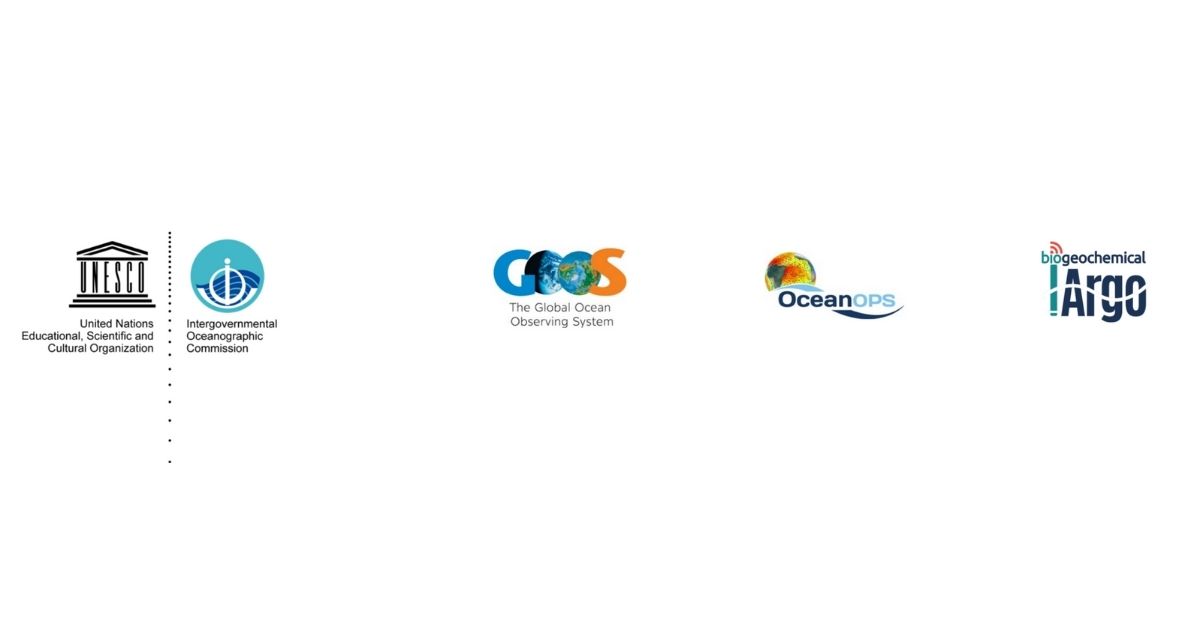The mission of the IOC/UNESCO-led Global Ocean Observing System (GOOS) is to lead the ocean observing community and create the partnerships to grow an integrated, responsive and sustained observing system that serves users as effectively as possible.
OceanOPS (ocean- ops.org), a joint IOC/UNESCO – World Meteorological Organization centre, offers vital network visualization, monitoring and support to implementers and users of the system, across an expanding network of global oceanographic and marine meteorological observing communities. As part of its 5-year strategic plan, OceanOPS seeks to develop its support services at the regional level, starting with the Mediterranean region in close cooperation with regional partners. OceanOPS has supported the development of the Argo profiling float network since its inception, and its multidisciplinary evolution in the integrated GOOS context.
Biogeochemical-Argo (BGC-Argo), one of the three missions of the international Argo program, aims to collect quality-controlled biogeochemical data to support both operational and scientific users in the context of societally relevant topics including climate change and ocean health. It has a target to reach an operational fleet of 1000 floats in the coming years.
Under the overall authority of the Executive Secretary of the IOC and reporting to the Head of the IOC Ocean Observations and Services Section, this position is located in the hosting organization Institut de la Mer, Sorbonne Université, Villefranche-sur-Mer, France, for its enabling environment, and is part of the OceanOPS team. The incumbent will be responsible for:
(a) BGC-Argo
In close communication with the BGC-Argo co-chairs, the Argo international and regional programs, and the Argo focal point at OceanOPS, to support the BGC-Argo mission though:
- Overall support and communication for BGC-Argo, including responsibility for:
-meeting and event organization, interaction and networking with national and regional contact points;
-writing and editing content of newsletters, websites and social media;
-developing communication material to help promote and fund the expansion of BGC-Argo;
-specification of monitoring tool developments for the BGC-Argo array;
-contribution to the development of capacity building activities;
-representing of BGC-Argo co-chairs at certain meetings; - The organization of interaction with the entire Argo community, including through regular meetings;
- The development of collaborations outside Argo through partnerships with GOOS and other biogeochemical networks, modeling programmes, and satellite communities.
(b) OceanOPS Mediterranean Regional Focus
Based on the OceanOPS work plan and priorities agreed by the GOOS Observation Coordination Group, and in balance with the tasks above, contributing OceanOPS team work through:
- Specific support to existing and emerging observing networks;
- A mapping of existing sustained ocean observing system implementers in the Mediterranean Sea, and creation of a status report;
- Communication with identified regional focal points in the Mediterranean Sea to register new observing platforms into OceanOPS;
- Representation of OceanOPS in Mediterranean regional ocean observing efforts, including in deployment/retrieval opportunities, and capacity building;
- Promoting regional partner activities and roles.
Required Qualifications:
Education
- An advanced university degree (Master’s degree or equivalent) in Oceanography, Marine Science, Earth Science or related field.
Work Experience
- A minimum 2 years of progressively responsible relevant experience in the field of ocean observations (ideally profiling floats or similar platforms) or services, of which preferably 1 year at the international level
- Experience in coordinating, managing and implementing projects or programs, national or international
- Experience in communication and outreach
Skills and Competencies
- Good knowledge of sea going data collection, oceanographic models or products, and in-situ observing systems
- Good project or program management skills;
- Very good communication skills (oral and written) with proven ability to make effective and persuasive oral presentations to both technical and general audiences
- Excellent analytical skills, including ability to identify complex issues and advise on ways forward respecting the constraints of the organizations involved;
- Proven ability to work both autonomously and as part of an integrated team with colleagues, staff and stakeholders at all levels, internal and external, including building and maintaining partnerships;
- Ability to work within a multicultural team with sensitivity and respect for diversity;
Languages
- Excellent knowledge of English
- Basic spoken knowledge of French
Desirable qualifications:
Work Experience
- Experience with International Organization and/or United Nations agencies
- Knowledge of other UNESCO languages
Title: Ocean observations Technical Coordinator for Biogeochemical-Argo & Mediterranean Region Focal Point, OceanOPS
Duty Station: Villefranche-sur-Mer, France
Type of Contract: Project Appointment, part time (60%, 3 days per week) with possibility to increase to full time based on availability of funds
Duration of Contract: 1 year, with possibility of extension based on satisfactory performance and on availability of funds
Annual Salary: Approx. 37 500 € / year net for 60% part time work, depending on specific entitlements, exempt from French income tax
Benefits and entitlements:
UNESCO’s salaries consist of a base salary and other benefits and entitlements which may include where applicable: 30 days annual leave, family allowance, medical insurance, pension plan etc. For more information about UN salaries, benefits and entitlements, please consult this ICSC booklet.
Selection and recruitment process:
Please note that candidates must complete an on-line application via the UNESCO career portal by 7 May 2021, and provide full and accurate information. No modifications can be made to the application once submitted. Evaluation of candidates is based on the criteria set in the Vacancy Announcement (VA). It may include tests and/or assessments as well as a virtual competency-based interview (CBI).
Only candidates who pass the selection process will be contacted and are subject to reference checks based on the information provided in their application.
Learn more about this position, the employers, and how to apply.





